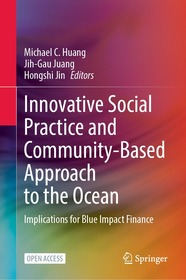
Innovative Social Practice and Community-Based Approach to the Ocean
Implications for Blue Impact Finance
- Publisher's listprice EUR 53.49
-
22 184 Ft (21 128 Ft + 5% VAT)
The price is estimated because at the time of ordering we do not know what conversion rates will apply to HUF / product currency when the book arrives. In case HUF is weaker, the price increases slightly, in case HUF is stronger, the price goes lower slightly.
- Discount 12% (cc. 2 662 Ft off)
- Discounted price 19 522 Ft (18 593 Ft + 5% VAT)
Subcribe now and take benefit of a favourable price.
Subscribe
22 184 Ft

Availability
Not yet published.
Why don't you give exact delivery time?
Delivery time is estimated on our previous experiences. We give estimations only, because we order from outside Hungary, and the delivery time mainly depends on how quickly the publisher supplies the book. Faster or slower deliveries both happen, but we do our best to supply as quickly as possible.
Product details:
- Publisher Springer Nature Singapore
- Date of Publication 2 October 2025
- Number of Volumes 1 pieces, Book
- ISBN 9789819691036
- Binding Hardback
- No. of pages256 pages
- Size 235x155 mm
- Language English
- Illustrations XIV, 256 p. 75 illus., 59 illus. in color. Illustrations, black & white 700
Categories
Long description:
"
This book stands as a pioneering work, illustrating a community-based and people-centered approach to the ocean. It meticulously outlines methodologies, procedures, and evaluations of social practices initiated by universities and think tanks, rooted in the actualization of social responsibility. Its outcomes extend towards implications for blue impact finance, highlighting a dedicated commitment to fostering positive change in oceanic environments.
Universities play a vital role in bridging research and education to create innovative solutions for communities as partnerships. Japan and Taiwan share similar concerns as maritime states and recognize that collaboration is the linchpin for strengthening relationships among faculty, students, and local residents, ensuring sustainability with a positive societal impact. To address this issue, the Ocean Policy Research Institute (OPRI) of the Sasakawa Peace Foundation collaborates with the Taiwan–Japan Alliance of Local Revitalization and Social Practice and the National Taiwan Ocean University. Through this joint effort, thematic case studies are selected to illuminate the methodology of impact assessment and evaluation for ocean-link initiatives within the framework of think tank–university social responsibility.
This book contains four key parts: I. Methodology of Problem-solving Structure for Coastal Region; II. Challenges and Opportunities of Ocean-link Industries; III. Innovative Forms of Blue Impact; and IV. Evaluating Blue Impact from Social and Environmental Perspective. Successful experiences have been shown to rely on problem identification, assessment, and endeavor, driven by shared motivations and the establishment of trust among research institutes, universities, and communities.
This is an open access book.
" MoreTable of Contents:
"
Chapter 1. Overview – Assessing the “Blue Impact” of Community-based ocean-related projects and the role of Think Tank – University Social Responsibility (Michael C. Huang, Jih-Gau Juang, Hongshi Jin).- Part I: Methodology of Problem-solving Structure for Coastal Region.- Chapter 2. Using a Logic Model to Assess the Social Impact of USR: How Universities Contribute to Local Communities (Kenji Okamura and Shingo Akaike).- Chapter 3. Using Jobs Theory to evaluate the use of mobile off-grid architecture (MOA) as a means of regional revitalization (Shota Tajima).- Part II: Challenges and Opportunities of Ocean-link Industries.- Chapter 4. Challenges Facing Ocean Education in Japanese Schools (Sachiko Oguma).- Chapter 5. Regional Revitalization through Development of Taiwan's Yachting Industry: Challenges and Opportunities (Hsueh-wen Chow, Weilin Lee Weiming Chen, and Jyh-Yeuan Lo).- Chapter 6. Creation of new industries using Blue Tech: The Challenge of Marine Open Innovation in Japan (Masahiro Hashimoto).- Part III: Innovative Forms of Blue Impact.- Chapter 7. A People-Centered Approach: The Case of Community-Based Eco-Tourism in Palau (Li-Yun Hsu and Hideyuki Shiozawa).- Chapter 8. Dynamic Material Culture and Digital Preservation: A case study of the Talugan Bunun Cultural Relics Museum (Ching-Ying Tung).- Part IV: Evaluating Blue Impact from Social and Environmental Perspective.- Chapter 9. Application of the Sustainable Livelihoods Framework to Analyze the Effect of the USR Program: A Case Study of the Badouzi Fishing Village (Hui-Chiao Wang).- Chapter 10. University–Community Engagement in Advancing Sustainable Fishing Village Development: A Case Study of a Successful Excellent Fishing Neighborhood Build-Up Project (Ching-Yu Yang, Wen-Hong Liu, Hsiao-Chien Lee, and Chih-Cheng Lin).- Chapter 11. Sustainable Financing for Marine Protected Areas (MPAs): A Case Study of the Shiretoko Natural World Heritage Site (Miko Maekawa, Junko Toyoshima, and Mitsutaku Makino).- Chapter 12. Digital Narratives of the Matsu Islands: A Case Study of Theme-Based Travel Planning by University Students in Taiwan (Cheng-Yi Eric Lin, Sheng-Wen Tseng).- Editorial Afterword: Towards Community-Based Maritime Countries (Ming-Hao Yang).
" More





